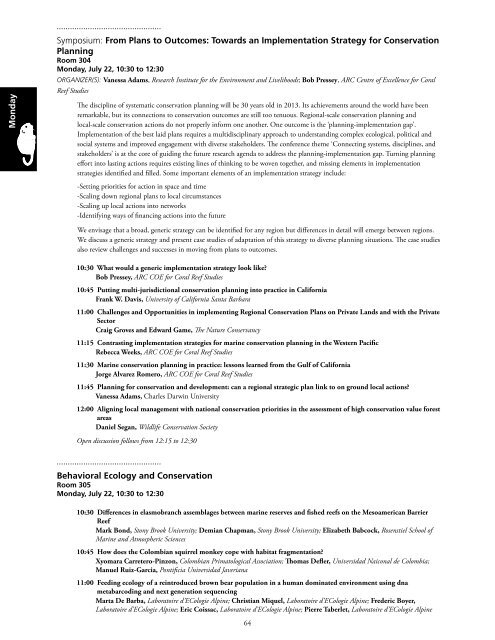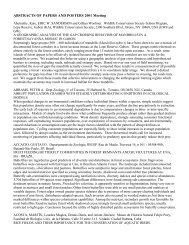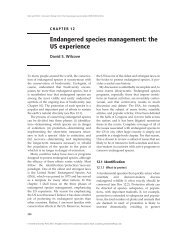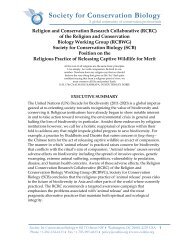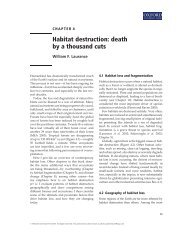ICCB 2013 Program - Society for Conservation Biology
ICCB 2013 Program - Society for Conservation Biology
ICCB 2013 Program - Society for Conservation Biology
You also want an ePaper? Increase the reach of your titles
YUMPU automatically turns print PDFs into web optimized ePapers that Google loves.
...............................................<br />
Monday<br />
Symposium: From Plans to Outcomes: Towards an Implementation Strategy <strong>for</strong> <strong>Conservation</strong><br />
Planning<br />
Room 304<br />
Monday, July 22, 10:30 to 12:30<br />
Organizer(s): Vanessa Adams, Research Institute <strong>for</strong> the Environment and Livelihoods; Bob Pressey, ARC Centre of Excellence <strong>for</strong> Coral<br />
Reef Studies<br />
The discipline of systematic conservation planning will be 30 years old in <strong>2013</strong>. Its achievements around the world have been<br />
remarkable, but its connections to conservation outcomes are still too tenuous. Regional-scale conservation planning and<br />
local-scale conservation actions do not properly in<strong>for</strong>m one another. One outcome is the ‘planning-implementation gap’.<br />
Implementation of the best laid plans requires a multidisciplinary approach to understanding complex ecological, political and<br />
social systems and improved engagement with diverse stakeholders. The conference theme ‘Connecting systems, disciplines, and<br />
stakeholders’ is at the core of guiding the future research agenda to address the planning-implementation gap. Turning planning<br />
ef<strong>for</strong>t into lasting actions requires existing lines of thinking to be woven together, and missing elements in implementation<br />
strategies identified and filled. Some important elements of an implementation strategy include:<br />
-Setting priorities <strong>for</strong> action in space and time<br />
-Scaling down regional plans to local circumstances<br />
-Scaling up local actions into networks<br />
-Identifying ways of financing actions into the future<br />
We envisage that a broad, generic strategy can be identified <strong>for</strong> any region but differences in detail will emerge between regions.<br />
We discuss a generic strategy and present case studies of adaptation of this strategy to diverse planning situations. The case studies<br />
also review challenges and successes in moving from plans to outcomes.<br />
10:30 What would a generic implementation strategy look like<br />
Bob Pressey, ARC COE <strong>for</strong> Coral Reef Studies<br />
10:45 Putting multi-jurisdictional conservation planning into practice in Cali<strong>for</strong>nia<br />
Frank W. Davis, University of Cali<strong>for</strong>nia Santa Barbara<br />
11:00 Challenges and Opportunities in implementing Regional <strong>Conservation</strong> Plans on Private Lands and with the Private<br />
Sector<br />
Craig Groves and Edward Game, The Nature Conservancy<br />
11:15 Contrasting implementation strategies <strong>for</strong> marine conservation planning in the Western Pacific<br />
Rebecca Weeks, ARC COE <strong>for</strong> Coral Reef Studies<br />
11:30 Marine conservation planning in practice: lessons learned from the Gulf of Cali<strong>for</strong>nia<br />
Jorge Alvarez Romero, ARC COE <strong>for</strong> Coral Reef Studies<br />
11:45 Planning <strong>for</strong> conservation and development: can a regional strategic plan link to on ground local actions<br />
Vanessa Adams, Charles Darwin University<br />
12:00 Aligning local management with national conservation priorities in the assessment of high conservation value <strong>for</strong>est<br />
areas<br />
Daniel Segan, Wildlife <strong>Conservation</strong> <strong>Society</strong><br />
Open discussion follows from 12:15 to 12:30<br />
...............................................<br />
Behavioral Ecology and <strong>Conservation</strong><br />
Room 305<br />
Monday, July 22, 10:30 to 12:30<br />
10:30 Differences in elasmobranch assemblages between marine reserves and fished reefs on the Mesoamerican Barrier<br />
Reef<br />
Mark Bond, Stony Brook University; Demian Chapman, Stony Brook University; Elizabeth Babcock, Rosenstiel School of<br />
Marine and Atmospheric Sciences<br />
10:45 How does the Colombian squirrel monkey cope with habitat fragmentation<br />
Xyomara Carretero-Pinzon, Colombian Primatological Association; Thomas Defler, Universidad Naiconal de Colombia;<br />
Manuel Ruiz-Garcia, Pontificia Universidad Javeriana<br />
11:00 Feeding ecology of a reintroduced brown bear population in a human dominated environment using dna<br />
metabarcoding and next generation sequencing<br />
Marta De Barba, Laboratoire d’ECologie Alpine; Christian Miquel, Laboratoire d’ECologie Alpine; Frederic Boyer,<br />
Laboratoire d’ECologie Alpine; Eric Coissac, Laboratoire d’ECologie Alpine; Pierre Taberlet, Laboratoire d’ECologie Alpine<br />
64


